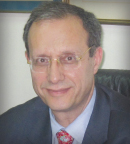
Nagi S. El Saghir, MD, FACP, FASCO
One of Lebanon’s highest national awards, the National Cedar Medal (Commander Rank), was recently bestowed upon Nagi S. El Saghir, MD, FACP, FASCO, in recognition of his extensive contributions to the fields of medicine, education, and science—and most particularly, for his efforts in the fight against breast cancer.
The Founding President of the Lebanese Breast Cancer Foundation, Professor El Saghir is a leader of cancer awareness campaigns and patient advocacy, patient support groups, patient empowerment workshops, and fundraising for support of needy patients with breast cancer. His research, teaching, patient care, and professional and community activities are recognized to have led to significant regional and international impact, as well as downstaging of breast cancer in Lebanon and improvement of patient outcome.
Dr. El Saghir is Professor and Head, Division of Hematology-Oncology, Department of Internal Medicine, Director of Breast Center of Excellence, Naef K. Basile Cancer Institute, American University of Beirut Medical Center. A 1978 graduate of the Free University of Brussels, he trained in New York in internal medicine and hematology-oncology.
Ceremony and Speech
The award was presented by the President of the Republic of Lebanon, General Michel Aoun, at a ceremony at Baabda Palace. Because of the COVID-19 pandemic, attendance at the ceremony was limited to a close circle of colleagues, friends, and family, including Professor El Saghir’s wife and daughter; Ghazi Zaatari, MD, Dean of the Faculty of Medicine at the American University of Beirut; Samir Alam, MD, Chief of Staff at the American University of Beirut; Mrs. Mirna Al‑Sabah Hobbalah, Vice President of the Lebanese Breast Cancer Foundation; and a number of other friends and well-wishers.
General Aoun and First Lady Nadia El-Chami have actively supported Professor El Saghir’s campaign to prevent breast cancer and other diseases, and the President praised the awardee’s ongoing efforts to educate the public. Professor El Saghir responded with the following speech:
How happy, proud, and thankful I am for this generous gesture from your Excellency to honor medicine and scientific research and concern for the health of patients and the health of society by granting me the honor of the National Cedar Medal (Commander Rank) in the midst of the political, economic, and health crises that our beloved country, Lebanon, is going through.
My colleagues and I, in Lebanon, have succeeded in securing the best methods of treatment, education, training, and medical research, and I am proud to receive this medal from your Excellency in honor of participating and leading in Lebanese, Arab, and international medical research; developing global guidelines for treating breast cancer patients; chairing the International Committee of the American Society of Clinical Oncology (ASCO) and Resource-Stratified Guidelines Advisory Group Committee; and the authorship of medical articles and books, in addition to establishing and chairing the Lebanese Society of Medical Oncology and the Lebanese Breast Cancer Foundation—for which we were keen on not losing our previous gains due to coronavirus and quarantine, so we chose to focus our campaign this year on teaching women breast self-examination through prescriptions.
We, your Excellency, have been able to change the face of breast cancer in Lebanon and transform it from a frightening disease to a disease that can be cured or coexisted with. The support of Your Excellency and that of the First Lady have contributed to our annual campaigns to combat breast cancer; we hope that we can preserve our achievements and eliminate everything that may cause loss, and allow me here to ask your kind directions and mention the interruption of many heart and cancer drugs, including tamoxifen, which we use to treat more than 20,000 to 30,000 Lebanese women, according to the statistics of 2,500 new cases every year.
I thank you, Mr. President, and I thank the American University of Beirut and all my colleagues for their support, my patients for their confidence, and my friends and family for their love. I promise you that this honor will be a new incentive to give and continue and contribute to the advancement and the crossing of our patients, students, and citizens to the shores of safety.

